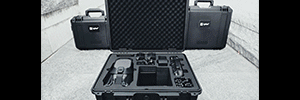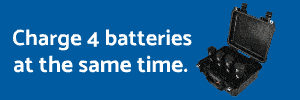I am hesitant to give the government any information. Over 249 grams, regulation says you must register, under 249 grams and it says you may register. Is there a good reason to register?
You are using an out of date browser. It may not display this or other websites correctly.
You should upgrade or use an alternative browser.
You should upgrade or use an alternative browser.
Is there a Good Reason to register your under 249 drone
- Thread starter WNYBill
- Start date
Not that I can think of. If you are flying recreational and you are in the US, there really isn't a good reason to register your under 250g drone; it won't accept a serial number: Remote ID for registered drones under 250gI am hesitant to give the government any information. Over 249 grams, regulation says you must register, under 249 grams and it says you may register. Is there a good reason to register?
- Joined
- Oct 12, 2016
- Messages
- 28,328
- Reactions
- 31,187
- Location
- Harrisburg, PA (US)
- Site
- mavichelp.com
Haven't seen that recommendation yet.under 249 grams and it says you may register
Keep in mind that all registered drones must broadcast RID data.
Here's the problem:Haven't seen that recommendation yet.
Keep in mind that all registered drones must broadcast RID data.
You go to fly your Mini 4 Pro and you want to fly for one hour and you have 2 batteries: the big battery and the little battery. Since you have inserted the big battery first which takes you over 250g, your Mini 4 Pro is properly registered in the FAA database including the standard RID details and the registration label atop your drone.
You take off with the battery and you get 40 minutes of flight time and your drone is happily broadcasting before you come home and land. You still want to fly for an additional 20 minutes you insert the little battery and you take off.
All of a sudden you are illegal. Your drone is registered in the FAA database but it isn't broadcasting because the little battery shuts off the RID broadcasting. You are flying a less than 250g drone for recreational purposes only and the flight is illegal unless you 1) attach an external broadcast RID model to your Mini and 2) go into the FAA database and update the RID details with the new RID number from your broadcast module or *cancel* the FAA registration and remove the label off your drone. And it doesn't help there is confusing verbiage across the internet from some places that [wrongly] claim even if you *own* the big battery (think "constructive possession") then you have to register.
Am I wrong?
I think what you will find is US recreational flyers who will not register and fly all day everyday with both batteries which again, is partially illegal. Imagine the problems that occur when you attach a strobe and use the little battery and you also now need to attach a broadcast module. Imagine what happens when the same is not true for your identical Mini 3 Pro drone or the other Mini class drones....or even sw version differences in the Mini 4 Pro?
This cluster is both DJI *and* the FAA fault. The DJI Mini 3 and Mini 4 series should all receive a DoC for a small-class of drone *regardless* their ultimate configuration IMO and these drones should be blocked from registration in the recreational portion of the portal.
Although true, this is not what the OP asked.which takes you over 250g, your Mini 4 Pro is properly registered in the FAA database including the standard RID details and the registration label atop your drone.
- Joined
- Oct 12, 2016
- Messages
- 28,328
- Reactions
- 31,187
- Location
- Harrisburg, PA (US)
- Site
- mavichelp.com
You're not wrong. However, I'm assuming the OP is talking about flying a drone that always has a takeoff weight of less than 250 grams.Am I wrong?
Although true, this is not what the OP asked.
Agreed and I think we all gave him the same answer, no good reason to register.You're not wrong. However, I'm assuming the OP is talking about flying a drone that always has a takeoff weight of less than 250 grams.
Sorry I just took a few minutes to later expand on some thoughts about <250g registration and why some recreational pilots get confused on what to do. It doesn't help there is so much mis-information out there; not everyone can watch PI for the correct answers.
Droning on and on...
Well-Known Member
Here's the problem:
You go to fly your Mini 4 Pro and you want to fly for one hour and you have 2 batteries: the big battery and the little battery. Since you have inserted the big battery first which takes you over 250g, your Mini 4 Pro is properly registered in the FAA database including the standard RID details and the registration label atop your drone.
Pretty minor problem.
If you're registered, sell your lighter batteries and replace them with the heavier ones. opposite if you're not registered, plan to only fly recreationally, and not attach anything that would make it weigh more than 250g.
This is not some sort of trap you can't get out of. Staying legal simply requires one to make some pretty easy choices.
Droning on and on...
Well-Known Member
Much easier solution: Add switch in settings on DJI Fly to enable RID with the light battery.
It's coming.
Agreed if you understand the rules, pretty minor problem. Unfortunately there are about a hundred people who understand it.Pretty minor problem.
If you're registered, sell your lighter batteries and replace them with the heavier ones. opposite if you're not registered, plan to only fly recreationally, and not attach anything that would make it weigh more than 250g.
This is not some sort of trap you can't get out of. Staying legal simply requires one to make some pretty easy choices.
Even more confusing when you have a switch that turns on and off but has no effect on registration.Much easier solution: Add switch in settings on DJI Fly to enable RID with the light battery.
It's coming.
When you register, what information do you have to give?
Think I'll save $50 and get the combo with the smaller batteries.
Think I'll save $50 and get the combo with the smaller batteries.
Droning on and on...
Well-Known Member
Agreed if you understand the rules, pretty minor problem. Unfortunately there are about a hundred people who understand it.
Actually worse than that... only 68. I counted.
They all post here.
Droning on and on...
Well-Known Member
Even more confusing when you have a switch that turns on and off but has no effect on registration.
Well, "confusing" is subjective.
IMO, there are a plethora of other compliance issues that are much more confusing to the vast majority of casual, recreational fliers than the RID ins and outs.
Like AGL vs. the telemetry displayed in Fly, which we obsessives (defintion: Anyone that visits MCDP daily) understand very clearly.
Yet, again IMO, this is a far more important issue than RID.
Flying anything is a very complex endeavor because of safety considerations. It's made far more complicated by other flying things in the air.
Don't take up the hobby if you can't handle the basic complexities exposed in the TRUST process.
I'm a (long retired side business) SCUBA instructor. A lot of similarities in risk levels, complexity, necessary knowledge to not die. Also, some interesting similarities in the split between recreational diving vs. technical diving, insofar as risk and knowledge.
No necessary regulations or enforcement there, however. The "rules" are self-enforcing, based on Darwinian principles. You comply, or you die.
OkieDoc
Member
If I understand regulations correctly, to get LAANC permission to fly in certain restricted airspace locations, one needs to have their drone registered with the FAA. This, even if one is a hobbyist, AND even though one's drone is below 0.55 lbs, to use LAANC the unit must be registered. I fly a DJI Mavic Mini, and am a recreational flyer but 95% of my flights are in Class D restricted airspace as it is extensive in the area where I live. Thus, in order to use LAANC to get permission to fly in Class D airspace, I had to register my drone even though it is at/below 249 grams. And, I have a Holy Stone RID unit stacked on top.
MARK (LI)
Well-Known Member
I agree that just because you own the PLUS battery, does not mean you have to register....but why have the larger battery unless you are going to use it?.....and if you do use it...it is going to take you over the 250 gram threshold.Here's the problem:
You go to fly your Mini 4 Pro and you want to fly for one hour and you have 2 batteries: the big battery and the little battery. Since you have inserted the big battery first which takes you over 250g, your Mini 4 Pro is properly registered in the FAA database including the standard RID details and the registration label atop your drone.
You take off with the battery and you get 40 minutes of flight time and your drone is happily broadcasting before you come home and land. You still want to fly for an additional 20 minutes you insert the little battery and you take off.
All of a sudden you are illegal. Your drone is registered in the FAA database but it isn't broadcasting because the little battery shuts off the RID broadcasting. You are flying a less than 250g drone for recreational purposes only and the flight is illegal unless you 1) attach an external broadcast RID model to your Mini and 2) go into the FAA database and update the RID details with the new RID number from your broadcast module or *cancel* the FAA registration and remove the label off your drone. And it doesn't help there is confusing verbiage across the internet from some places that [wrongly] claim even if you *own* the big battery (think "constructive possession") then you have to register.
Am I wrong?
I think what you will find is US recreational flyers who will not register and fly all day everyday with both batteries which again, is partially illegal. Imagine the problems that occur when you attach a strobe and use the little battery and you also now need to attach a broadcast module. Imagine what happens when the same is not true for your identical Mini 3 Pro drone or the other Mini class drones....or even sw version differences in the Mini 4 Pro?
This cluster is both DJI *and* the FAA fault. The DJI Mini 3 and Mini 4 series should all receive a DoC for a small-class of drone *regardless* their ultimate configuration IMO and these drones should be blocked from registration in the recreational portion of the portal.
Some people own the PLUS battery so when they fly in countries where there are less restrictions (like "Mexico") but it really shouldnt matter since I am told the FAA doesn't really care about a few grams unless you break some of the more serious laws.I agree that just because you own the PLUS battery, does not mean you have to register....but why have the larger battery unless you are going to use it?.....and if you do use it...it is going to take you over the 250 gram threshold.
Last edited:
I'm surprised I didn't know the best way to answer this right away, had to browse around to be sure.If I understand regulations correctly, to get LAANC permission to fly in certain restricted airspace locations, one needs to have their drone registered with the FAA. This, even if one is a hobbyist, AND even though one's drone is below 0.55 lbs, to use LAANC the unit must be registered. I fly a DJI Mavic Mini, and am a recreational flyer but 95% of my flights are in Class D restricted airspace as it is extensive in the area where I live. Thus, in order to use LAANC to get permission to fly in Class D airspace, I had to register my drone even though it is at/below 249 grams. And, I have a Holy Stone RID unit stacked on top.
I am almost positive a recreational flyer can legally fly an unregistered drone in controller airspace with automatic LAANC authorization. I am not finding any mechanism in any of the approved apps that prevents you from gaining authorization if you do not specific either your drone make/model or your FAA recreational pilot registration details.
It doesn't make sense that recreational pilots would be prohibited from flying their unregistered DJI Mini drones in controlled airspace but are ok to fly larger drones that are registered. Why? Lately I've never seen an automatic LAANC authorization issued by drone type for recreational flyers. However, it is possible there are some locations where the requirements are more strict but in general, I don't believe your drone must be registered to fly in controlled airspace.
Unfortunately, there's various documentation that specifically references the process which points out the proper steps for using the automated LAANC process and it does mention getting your TRUST and registering your drone. While there are no inputs for these variables, it is true you cannot fly a recreational drone in controlled airspace (or even in uncontrolled airspace) without a TRUST so it stands to reason, the requirement could be interpreted to include drone registration as well. The work is sloppy because the 250g exception is buried and may be misleading; again we understand *everything* but we are not everybody. See here for example: https://www.faa.gov/uas/recreational_flyers/authorization
Similar threads
- Replies
- 3
- Views
- 1K
- Replies
- 45
- Views
- 13K
- Replies
- 9
- Views
- 670
- Replies
- 2
- Views
- 1K
DJI Drone Deals
1. Mini 2
2. Mini 3 Pro
3. Mini 4 Pro
4. Air 2s
5. Air 3
6. Avata 2
7. Mavic 3 Pro
8. Mavic 3 Classic
2. Mini 3 Pro
3. Mini 4 Pro
4. Air 2s
5. Air 3
6. Avata 2
7. Mavic 3 Pro
8. Mavic 3 Classic
New Threads
-
-
-
-
What am I doing wrong? Unlock after LAANC approval.
- Started by twickers14
- Replies: 1
-










